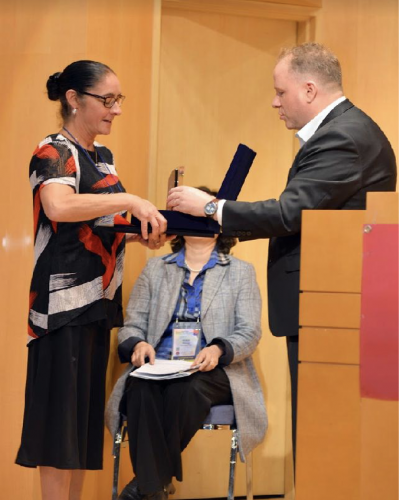
February 2021
This month's voice:
Kara Mac Donald, "Belonging and Identity: The Value of Academic Association Membership"
Introduction
Lindsay Herron
Editor, KOTESOL Voices
For me, the name Kara Mac Donald is synonymous with professional development and the mantra of KOTESOL, "Teachers helping teachers." It was at a KOTESOL conference that I first met her, and it was at a TESOL International conference that I really got to know her. Kara was the recipient of the first KOTESOL President's Award I ever gave and one of the first people I approached when we started doing AMA ("Ask Me Anything") Mondays at the KOTESOL Membership Lounge. (Check out her AMA here, by the way! It was thoroughly fascinating and is well worth a watch.) As anyone who has met her can attest, she's a veritable dynamo in person: accessible, intelligent, funny, and friendly, virtually vibrating with energy and enthusiasm.
Kara is deeply involved in various professional organizations and a vital part of KOTESOL's infrastructure, despite living in the United States now, and I was curious about how her participation and volunteerism intersected with her professional goals and personal growth. When I invited her to contribute to KOTESOL Voices and suggested this might be a productive path to explore, though, I didn't anticipate the eloquent paean to teachers organizations that she crafted! This month, with the 28th Korea TESOL International Conference just around the corner, is truly the perfect time for such a thoughtful, insightful reflection on the organizations that inspire and influence us – in so many different ways. I hope you enjoy Kara's piece – and enjoy considering how you, too, find and create personal and professional meaning through KOTESOL and your other affiliations!
Belonging and Identity: The Value of Academic Association Membership
Kara Mac Donald
Teacher identity and its development are interesting to me as a teacher trainer, both supporting professional development among new teachers through pre-service training as well as fostering the further and ongoing development of it among veteran teachers through in-service training. When invited to contribute something to KOTESOL Voices, some suggestions for guidance related to me and my experiences were presented. After reflecting on those suggestions, I came to see that each individual topic can actually be categorized under one heading or seen through one lens: teacher identity and engagement with other educators.
Both my personal identity and my social identity have been interconnected with my professional experiences as a language educator and that identity, and vice versa. In this piece, I share a reflection back on my own journeys over my career as a novice, emerging, established, and pre-veteran teacher and how academic associations overall, with particular attention to KOTESOL, have informed and molded my whole identity and my sense of belonging not only to KOTESOL but also to the broader field of ELT. In doing so, I hope readers will reflect on the role of academic associations, such as KOTESOL, on their professional identity and sense of belonging. The piece closes with a few article links examining the value of academic associations and identity for readers to explore.
Kind of the Beginning of Academic Membership
English Australia was it. Although I had attended symposiums and small conferences during my MA, I didn’t engage with the association membership. I just went to events and moved on. After my MA, intertwined with adjacent postgraduate studies prior to doctoral studies, I launched a small language-related business, taught contractually at a private international high school and worked as an adjunct at night at a university. I found that I missed academic engagement, as the academic interaction on a physical campus as a matriculated postgraduate student was gone. I found one ELT association thanks to the author of an article of keen interest to me, and I contacted her. She told me she would be presenting at an upcoming conference, English Australia. I registered, and I went. From that experience, I felt legitimized as a novice scholar conversing with a veteran scholar about her work. Yes, it was brief, but it felt amazing. From that experience, I reached out to another professor working in the same area. In some form, through membership to the association, I gained access to academics who were well established in their careers, and I interacted and learned from them.
*** Reflection Moment: Readers, do you remember your first academic conference? What stood out for you? Why?
Towards the end of my doctoral program, my thesis supervisor suggested I submit a proposal to the TESOL International Convention. I did. Luckily, I was accepted. The broad range of presentation topics and the multitude of sessions available astounded me. The expo hall was amazing. I, a young professional, was able to browse books and chat with publisher representatives. I knew I wanted to attend the conference the following year and have done so every year since 2006. Shortly after that first convention, I joined the TESOL NNEST-IS, and my interaction with membership expanded as did my leadership roles in the association. The sense of community that emerged within TESOL was so inviting to me.
*** Reflection Moment: Readers, who inspired you to be part of KOTESOL? Why?
Kind of the Middle of Academic Membership
I would say that Korea—and KOTESOL—could be considered the middle of my career. I became a member of KOTESOL three months after arriving in Korea and attended the 2006 KOTESOL International Conference that same month. The first thing I was drawn to was that it was an international conference, but it was accessible in size, compared to the TESOL International conference. What I had found beneficial and attractive (i.e., enormity in size) just a few years before was not so much what I found valuable at the time. Easy access to member services, volunteer roles, and a bootstrap education in Korean ELT through professional development at the national and chapter levels was perfect for me, as I was new to Korea. Through holding various roles, I formed professional and personal relationships and found a sense of belonging in the country and Korean ELT. I felt legitimatized again by senior academics in Korean ELT, from kindergarten teachers to university professors. Thanks to them, I became a more context-appropriate teacher trainer in higher education and across many ELT realms, from teaching kindergarten to engineering and bio-medical postgraduate students through my employer.
Knowing how beneficial KOTESOL was for me to understand and situate myself within Korean ELT, I signed up to be a member of California TESOL (CATESOL) while still in Korea, three months in advance of arriving in California. I registered for their spring state-wide annual conference happening shortly after my scheduled arrival in the state, and I signed up to be a volunteer for bag-stuffing the night before and a room monitor for sessions the weekend of the conference in order to get to know members and current ELT topics in the region. I was certainly on the periphery of the camaraderie among most of the volunteers, who knew each other and had likely accomplished putting on many events together previously. Yet it was a welcoming experience at various levels, and the association began to teach me about ESL in the California context.
The "Now" of Academic Membership & KOTESOL: What I Value
My sense of belonging and my identity are informed by the continued active involvement in TESOL, KOTESOL, and CATESOL. My involvement in each of these associations has changed over time, yet the involvement has shaped me. I hold membership to foreign language teaching and applied linguistics associations and attend their conferences, which I greatly enjoy. Yet there is something special about ELT and, in particular, the affiliates of TESOL for me.
The most common value found among members of academic associations is access to the peer-reviewed journals, conferences, and continuing education offered, and the means to stay abreast of the latest trends in the field. I certainly am among those who value these aspects of association membership. However, I initially used such membership to learn about being an academic and later stay abreast in academia. I also have used membership strategically to acquire an understanding of the local ELT context where I was. Volunteer roles have provided me with a variety of professional skills. Yet the aspect I most value in my academic association memberships and involvement within them is the people and the personal networks. Hands down.
Above all, the role of KOTESOL, in total sincerity, has shaped me. It continues to inform me, my identity, my research focus (in part), and my desired contributions to the associations. KOTESOL established me as an international EFL educator, contributing to my on-the-ground classroom and platform teacher practices and those I share with ELT and FLT professionals. It welcomed me from day one and has continued to welcome me despite my current non-Korea based employment. It permits me to be part of Korean ELT, which is dear to me, and to both maintain old "colleague-ships" and foster many new ones over the years. Without active involvement in KOTESOL, a large part of my professional and personal activities would not exist. If KOTESOL didn’t exist in my life, a meaningful part of my identity would not exist.
*** Reflection Moment: Readers, how does membership in other associations (short- or long-term) inform you as a professional and as a person?
Association Membership: What Members Value
KOTESOL’s own Tory Thorkelson published an article in the Korea TESOL Journal, “Language Teaching Organizations and Professional Job Satisfaction,” that examines exactly what the title says and offers ways EFL associations can attract and retain members.
Another article by Joe Rominiecki in Associations Now, a publication covering association management and their impact, takes a larger perspective and describes what members value in the benefits of scholarly associations and member relationships. Take a look here.
No One Speaks "My Language"; I Need to "Go Home to Family"
I could draw on so many comments from KOTESOL veteran members regarding the value of KOTESOL, but readers would likely know the individuals, making the comments less impactful. So in closing, I draw on a comment from a longtime colleague and dear friend as an active TESOL member, active CATESOL member, and the list goes on. She, as the only ESL teacher in a U.S. public school throughout the 1990s and likely beyond, felt her colleagues had no idea of the battles she faced and the mission she undertook for her students. She felt that no one “spoke her language.” Her TESOL membership and active involvement permitted her to be among “family” and interact with those that “spoke her language” (i.e., ELT).
My experiences are distinct, past and present. Yet sometimes I need to return to my familiar “neighborhood community” (Korean ELT), and sometimes I need to “go home to family” (KOTESOL). Thank you KOTESOL for always “welcoming me home” and “speaking my language.” For those reading now, KOTESOL values you. I am just one example.
Conclusion
Closing a written piece with an opening, rather than closure, is a no-no. Yet I will do it.
*** Readers, what creates the draw to KOTESOL and its community for you? Why do you pursue this member identity?

About the Author
Kara Mac Donald is an associate professor at the Defense Language Institute in Monterey, CA, USA. She conducts pre-service and in-service faculty training and offers academic support to students. Her background consists of over twenty years in English and foreign language teaching, teacher training, and faculty development across elementary, secondary, and higher education. She earned a master's in applied linguistics, TESOL, and a doctorate in applied linguistics.


